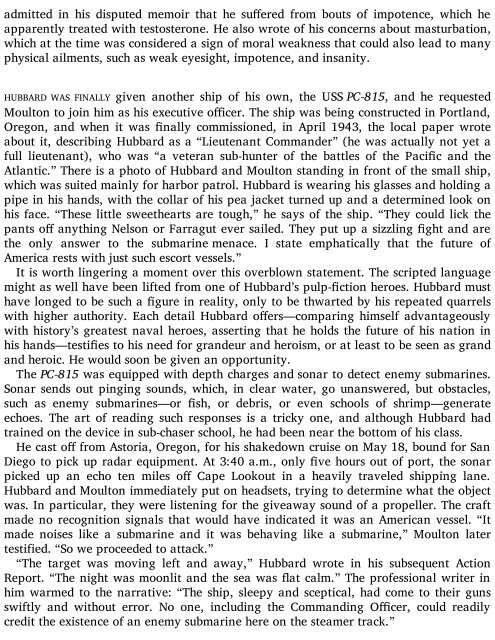going-clear-scientology-hollywood-and-the-prison-of-belief-by-lawrence-wright-2
going-clear-scientology-hollywood-and-the-prison-of-belief-by-lawrence-wright-2
going-clear-scientology-hollywood-and-the-prison-of-belief-by-lawrence-wright-2
Create successful ePaper yourself
Turn your PDF publications into a flip-book with our unique Google optimized e-Paper software.
admitted in his disputed memoir that he suered from bouts <strong>of</strong> impotence, which he<br />
apparently treated with testosterone. He also wrote <strong>of</strong> his concerns about masturbation,<br />
which at <strong>the</strong> time was considered a sign <strong>of</strong> moral weakness that could also lead to many<br />
physical ailments, such as weak eyesight, impotence, <strong>and</strong> insanity.<br />
HUBBARD WAS FINALLY given ano<strong>the</strong>r ship <strong>of</strong> his own, <strong>the</strong> USS PC-815, <strong>and</strong> he requested<br />
Moulton to join him as his executive ocer. The ship was being constructed in Portl<strong>and</strong>,<br />
Oregon, <strong>and</strong> when it was nally commissioned, in April 1943, <strong>the</strong> local paper wrote<br />
about it, describing Hubbard as a “Lieutenant Comm<strong>and</strong>er” (he was actually not yet a<br />
full lieutenant), who was “a veteran sub-hunter <strong>of</strong> <strong>the</strong> battles <strong>of</strong> <strong>the</strong> Pacic <strong>and</strong> <strong>the</strong><br />
Atlantic.” There is a photo <strong>of</strong> Hubbard <strong>and</strong> Moulton st<strong>and</strong>ing in front <strong>of</strong> <strong>the</strong> small ship,<br />
which was suited mainly for harbor patrol. Hubbard is wearing his glasses <strong>and</strong> holding a<br />
pipe in his h<strong>and</strong>s, with <strong>the</strong> collar <strong>of</strong> his pea jacket turned up <strong>and</strong> a determined look on<br />
his face. “These little swee<strong>the</strong>arts are tough,” he says <strong>of</strong> <strong>the</strong> ship. “They could lick <strong>the</strong><br />
pants o anything Nelson or Farragut ever sailed. They put up a sizzling ght <strong>and</strong> are<br />
<strong>the</strong> only answer to <strong>the</strong> submarine menace. I state emphatically that <strong>the</strong> future <strong>of</strong><br />
America rests with just such escort vessels.”<br />
It is worth lingering a moment over this overblown statement. The scripted language<br />
might as well have been lifted from one <strong>of</strong> Hubbard’s pulp-ction heroes. Hubbard must<br />
have longed to be such a gure in reality, only to be thwarted <strong>by</strong> his repeated quarrels<br />
with higher authority. Each detail Hubbard oers—comparing himself advantageously<br />
with history’s greatest naval heroes, asserting that he holds <strong>the</strong> future <strong>of</strong> his nation in<br />
his h<strong>and</strong>s—testies to his need for gr<strong>and</strong>eur <strong>and</strong> heroism, or at least to be seen as gr<strong>and</strong><br />
<strong>and</strong> heroic. He would soon be given an opportunity.<br />
The PC-815 was equipped with depth charges <strong>and</strong> sonar to detect enemy submarines.<br />
Sonar sends out pinging sounds, which, in <strong>clear</strong> water, go unanswered, but obstacles,<br />
such as enemy submarines—or sh, or debris, or even schools <strong>of</strong> shrimp—generate<br />
echoes. The art <strong>of</strong> reading such responses is a tricky one, <strong>and</strong> although Hubbard had<br />
trained on <strong>the</strong> device in sub-chaser school, he had been near <strong>the</strong> bottom <strong>of</strong> his class.<br />
He cast o from Astoria, Oregon, for his shakedown cruise on May 18, bound for San<br />
Diego to pick up radar equipment. At 3:40 a.m., only ve hours out <strong>of</strong> port, <strong>the</strong> sonar<br />
picked up an echo ten miles o Cape Lookout in a heavily traveled shipping lane.<br />
Hubbard <strong>and</strong> Moulton immediately put on headsets, trying to determine what <strong>the</strong> object<br />
was. In particular, <strong>the</strong>y were listening for <strong>the</strong> giveaway sound <strong>of</strong> a propeller. The craft<br />
made no recognition signals that would have indicated it was an American vessel. “It<br />
made noises like a submarine <strong>and</strong> it was behaving like a submarine,” Moulton later<br />
testified. “So we proceeded to attack.”<br />
“The target was moving left <strong>and</strong> away,” Hubbard wrote in his subsequent Action<br />
Report. “The night was moonlit <strong>and</strong> <strong>the</strong> sea was at calm.” The pr<strong>of</strong>essional writer in<br />
him warmed to <strong>the</strong> narrative: “The ship, sleepy <strong>and</strong> sceptical, had come to <strong>the</strong>ir guns<br />
swiftly <strong>and</strong> without error. No one, including <strong>the</strong> Comm<strong>and</strong>ing Ocer, could readily<br />
credit <strong>the</strong> existence <strong>of</strong> an enemy submarine here on <strong>the</strong> steamer track.”


